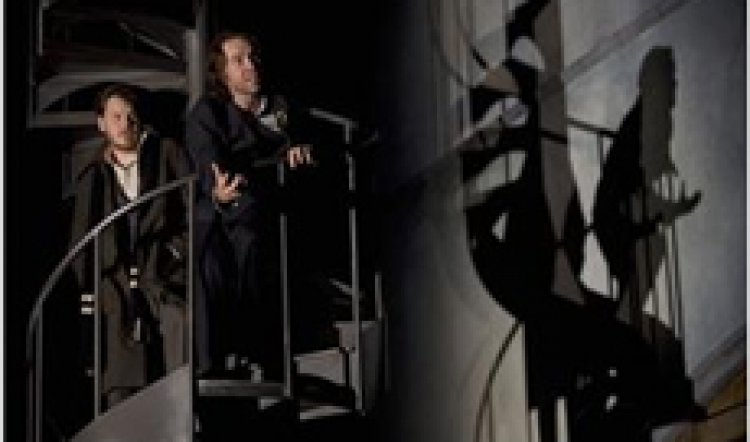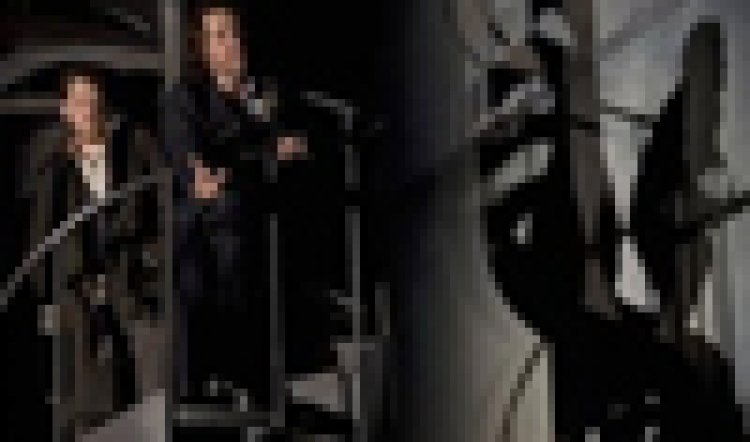
Hamlet
Hamlet, Bell Shakespeare Company, Drama Theatre at Sydney Opera House;June 6-July 12, 2008; ph: (61 2) 9250 7777. Then Jul 16-Aug 2, 2008, The Playhouse, The Arts Centre, Melbourne; ph: Ticketmaster 136100, www.bellshakespeare.com.au.
Creatives: Director: Marion Potts, Set design: Fiona Crombie, Lighting design: Nick Schlieper; Composer: Sarah Blasko, Sound design: Stefan Gregory; Fight director: Nigel Poulton; Assistant director: Nic Dorward; Vocal Coach: Carmen Lysiak. Cast: Sarah Blasko, Laura Brent, Brendan Cowell, Russell Kiefel, Joe Manning, Heather Mitchell, Colin Moody, Barry Otto, Paul Reichstein, Tim Richards, Chris Ryan, Darren Weller, Matthew Whittet.
It is said that casting is half the battle in getting a production underway and moving in the right direction. Marion Potts’s new Hamlet is proof of the truth in that. The strength of the cast and the conviction in their playing is simply splendid.
It’s worth going back, for a moment, to late 2007 when word first drifted out that she had cast Brendan Cowell as the tragic prince of Denmark and had scooped up Colin Moody even as the controversy over his departure from the STC Actors’ Company was at its height. At that point both men were labeled “trouble”, “difficult”, “temperamental” and other epithets not intended as flattery. Another set of descriptions, however, could be “often brilliant”, “easily bored” and “don’t suffer fools gladly”, which draws another picture altogether.
Now, Cowell and Moody are the toxic heart and soul of Potts’s remarkable production. They are the fires that burn in the dankly dripping, mist-wreathed halls of Elsinore. It’s a place where the sun may shine but rarely penetrates the atmosphere of murderous ambition and smouldering revenge that swirls about the two men and their hapless courts.
As the usurping king Claudius, Moody is an elegant, smooth-talking thug whose passion for his dead brother’s wife is all the more disturbing for its gentleness in the face of an otherwise ruthless demeanour. His foil and focus is Heather Mitchell. Her Queen Gertrude is a woman whose physical delicacy and beauty are so at odds with her surroundings, even young Ophelia seems robust by comparison. Dressed in a diaphanous jade-coloured gown, for all the world like a corsage to be worn by a triumphant male, Gertrude stands between Claudius and Hamlet, throwing the dark aspect of their rivalry and jealousy into sharp focus.
[page]Cowell’s Hamlet is a wondrous creation who begins his journey in boot-chucking, youthful petulance. Then, as he observes his mother and uncle less than two months after his father’s death, and after his pivotal encounter with The Ghost, his resentment gradually transforms into an agony of rage. Lashing out verbally and physically at his mother, Ophelia, Laertes (Chris Ryan) and Polonius, their bewilderment and sorrow at once assuages and intensifies his own torment. His pain is so great that his cruelty is as recognisable as if he were slashing his own flesh in a frenzy of self-harm.
Over the course of the evening Hamlet’s anger is tempered by grief, weariness and a growing desire for revenge. Finally he reached a plateau – a kind of steely, humorous calm – that is much madder and more alarming than a more conventional expression of insanity. By the end, Hamlet’s tragedy is total as he realises the futility of retribution and the awful consequences of his actions. Rarely has maturity been achieved at such terrible cost.

Meanwhile, caught in the maelstrom of conflicting power plays, courtiers and friends are buffeted back and forth like helpless birds in a gale. The mortal danger inherent in their positions at court is stark: Wooo it’s cold, says Hamlet, playfully. Yes it is, agrees his best friend. Actually, I’m hot, says Hamlet with menace behind his grin. Me too, says his friend, nervously … It’s the age-old lot of the royal attendant: kow-tow or risk decapitation. Wear humiliation like an ermine-edged robe.
Nevertheless, moments of poignant dignity light the stage when Barry Otto – a flapping, foolish, fearful Polonius – gathers himself to farewell his son with advice that miraculously sounds newly minted (“neither a borrower nor a lender be”, “to thine own self be true”). When a play is so well known and contains phrases and language that have long been part of everyday English, it is a considerable achievement when an actor is able to approach the famous speeches and soliloquies as if they were written yesterday. Brendan Cowell also carries it off and even when he gazes into the empty sockets of Yorick’s skull, his comment to Laertes is wonderingly fresh rather than a 400-year-old theatre joke.
[page] Heightening the sense of dark foreboding is a streak of comedy wrought mainly by casting Tim Richard and Matthew Whittet as Rosencrantz and Guildenstern and Darren Weller as Osric. Their physical comedy and the laughter they evoke are relief valves in the building tension, but also make the danger of the situation palpable. Stefan Gregory’s soundscape also adds an ominous filmic quality to the show as it proceeds towards the inevitable end. Less successful on opening night at least were the songs which open and then punctuate the action, composed and performed by Sarah Blasko. Her face mike and/or the sound balance muddied the lyrics and the one thing you need in Shakespeare is to hear the words.
Heightening the sense of dark foreboding is a streak of comedy wrought mainly by casting Tim Richard and Matthew Whittet as Rosencrantz and Guildenstern and Darren Weller as Osric. Their physical comedy and the laughter they evoke are relief valves in the building tension, but also make the danger of the situation palpable. Stefan Gregory’s soundscape also adds an ominous filmic quality to the show as it proceeds towards the inevitable end. Less successful on opening night at least were the songs which open and then punctuate the action, composed and performed by Sarah Blasko. Her face mike and/or the sound balance muddied the lyrics and the one thing you need in Shakespeare is to hear the words.
Fiona Crombie’s spacious, mainly empty setting is effectively abstract and an invitation to imagine. One wall is a creepily seeping, wuthering height of royal tombs. It is fronted by a narrow moat where hands are washed, hot and bothered faces sluiced, The Ghost walks and blessings from the dead sought. A freestanding spiral staircase doubles as battlements and also, when starkly lit by a spotlight, as a sculpture whose writhing shadow adds to the sense of unease.
That unease turns to the kind of edge-of-the-seat horror usually associated with cinema when Hamlet and Laertes begin their fencing match. Hamlet is carefree and joking with his dear friend, provoking him – through his refusal to take the contest seriously – to frustrated retaliation. In not treating the fight as a theatrical fencing exhibition but rather as a tussle between two young men of reasonable but not Olympic skill, the casual and almost accidental violence is all the more appalling. The same can be said for the various deaths: horrible in the absence of melodrama and their realism. It’s an unusual mix and awfully powerful.
Marion Potts has scored a personal triumph with this production. It’s clear, modern, relevant, compellingly dramatic, funny and finally, deeply moving. In assembling this cast and this creative team she took her courage in both hands and followed her instincts and convictions. The result is spectacular.



